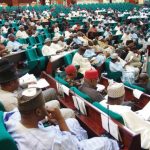
The Nigerian government on Thursday gave an update on the implementation of the new National Minimum Wage.
Mrs Zainab Usman, the Minister of Finance, said that the financial implications had been worked out by the Presidential Committee set up and that the report had been submitted to the president.
She said this on Thursday in Abuja, while addressing a news conference on the state of the Nigerian economy.
“We have looked at the report and what we are working on now is how we can finance it”, NAN quoted her as saying.
“Apart from the increase of the minimum wage from N18, 000 to N30, 000, there is also consequential adjustment that we have to negotiate with the labour unions.
“The total implication of that would be worked out only after the negotiations and that would involve determining how much increase every other staff that is above the minimum wage would get.
“It could be a flat amount or a proportion, but the other aspect that is clear is that there would be an increase for the National Youth Service Corps (NYSC) as well because by the Act they should earn at least the minimum wage and the NYSC also has to increase to that N30, 000.
“So, because we have not done the negotiation with labour, I cannot give you the details of what we are projecting because it is simply on projections, at the end of the day, it is what we agree with labour that will be the amount that is due.”
On the issue of debt increase from N12.2 trillion to N23.0 trillion, Usman said it was by design.
According to her, the Economic Recovery and Growth Plan (ERGP) is designed to reflate the economy and plunge the nation out of recession by borrowing in the first to third year and in the fourth year start reducing the borrowing.
She said the borrowing was majorly to finance capital projects, which was why the nation was able to come out of recession.
“The method we adopted helped us but the consequence is this increase in debt and that is why the Ministry of Finance and all its agencies are working to ensure that we increase revenue.
“At 19.0 per cent debt to Gross Domestic Product (GDP), we still are the lowest among our comparator countries.
“The problem we have is a revenue problem and that is why all we are doing is to make sure we enhance our revenue, if our revenue performs optimally, we are in a good place as far as debt is concerned.”





